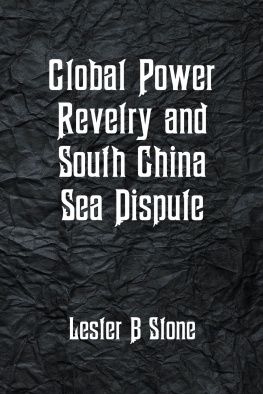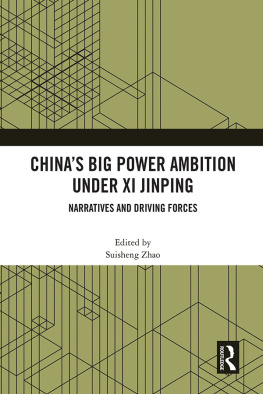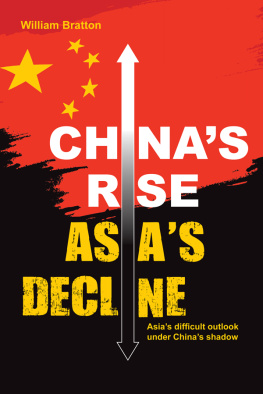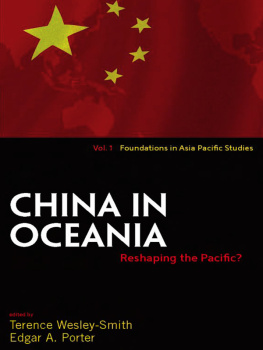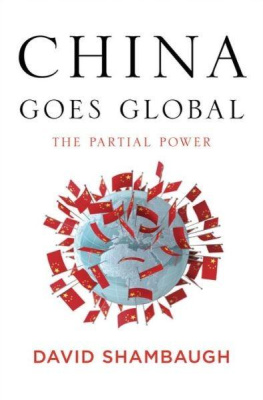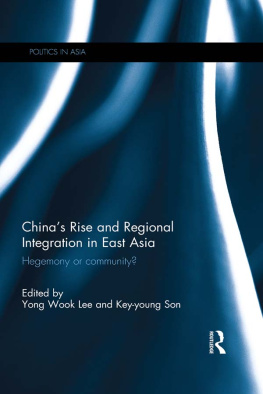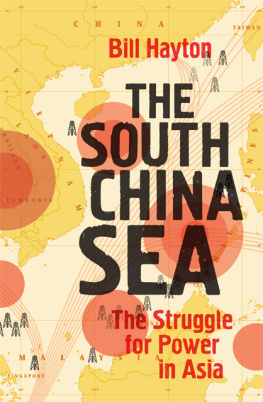Chinas Strategic Interests in the South China Sea
This book explores Chinas strategic interests in the South China Sea, with specific emphasis on power projection and resource security. Chinas regional actions and reactions are reshaping power dynamics in East and South-East Asia, while economic and geopolitical futures depend on the variegated outcomes of these complex and iterative relationships with neighbouring countries and the USA.
The Introduction assesses Chinas external and internal dynamics and influences, examines Chinas search for energy and resources, and looks at Chinas oil security through the lenses of diplomacy and economics. The Country Case Studies explore Chinas relationships with Japan, the Philippines, the USA and Vietnam with regards to claims, disputes, conflicts and strategic interests in the South China Sea. The Conclusion incorporates insights and builds on a number of factors and issues to produce a better understanding of the incentives, motivations and rationales that propel China to project power and secure resources in the South China Sea.
Key features:
offers an in-depth analysis of Chinas strategic interests in the South China Sea;
assists scholars and students in understanding Chinese relationships with neighbouring countries;
explains Chinas power projection and its implications on US economic and security pacts;
explores the links between peace, prosperity and security, and the acts supporting these goals.
Sigfrido Burgos Cceres is a consultant specializing in international development, political economy and foreign affairs. From 200712 he was based in Rome, Italy, at the Food and Agriculture Organization of the United Nations. He has published peer-reviewed journal articles on Chinas natural resource quests in Africa, South-East Asia, South America and globally. Together with Sophal Ear he co-authored The Hungry Dragon: How Chinas Resource Quest Is Reshaping the World (Routledge, 2013). He lives in Mobile, Alabama, with his wife.
Chinas Strategic Interests in the South China Sea
Power and resources
Sigfrido Burgos Cceres
First edition published 2014
by Routledge
2 Park Square, Milton Park, Abingdon, Oxon OX14 4RN
and by Routledge
711 Third Avenue, New York, NY 10017
Routledge is an imprint of the Taylor & Francis Group, an informa business
2014 Sigfrido Burgos Cceres
The right of Sigfrido Burgos Cceres to be identified as the author of this work has been asserted by them in accordance with the Copyright, Designs and Patents Act 1988.
All rights reserved. No part of this book may be reprinted or reproduced or utilised in any form or by any electronic, mechanical, or other means, now known or hereafter invented, including photocopying and recording, or in any information storage or retrieval system, without permission in writing from the publishers.
Trademark notice: Product or corporate names may be trademarks or registered trademarks, and are used only for identification and explanation without intent to infringe.
British Library Cataloguing in Publication Data
A catalogue record for this book is available from the British Library
Library of Congress Cataloging in Publication Data
Burgos Caceres, Sigfrido, author.
Chinas strategic interests in the South China Sea : power and resources / Sigfrido Burgos Cceres. First edition.
pages cm
Includes bibliographical references and index.
Summary: Explores Chinas strategic interests in the South China Sea, with a specific emphasis on power projection and resource security. Contains sections on Chinas power and resources and case studies on Japan, Vietnam, the USA and the Philippines, and discusses how Chinas actions are reshaping the power dynamics in East and South-East Asia Provided by publisher.
1. ChinaStrategic aspects. 2. South China SeaStrategic aspects. 3. National securityChina. 4. Sea-powerChina. 5. ChinaForeign relations21st century. 6. Energy securityChina. 7. Natural resourcesChina. 8. Natural resourcesSouth China Sea. I. Title.
UA835.B86 2013
355'.033051dc23
2013022046
ISBN: 978-1-85743-709-6 (hbk)
ISBN: 978-1-31587-933-8 (ebk)
Typeset in Times New Roman
by Taylor & Francis Books
Europa Commissioning Editor: Cathy Hartley
Editorial Assistant: Amy Welmers
Contents
PART I
Introduction
PART II
Country case studies
PART III
Conclusion
This book examines the Peoples Republic of Chinas strategic interests in the South China Sea, and focuses on power projection and resource security. Certainly, China pursues other strategic interests, but in order to make this book a manageable endeavour it discusses chiefly the topics of power and resources while making connections to economics, governance, national security, politics and society. It takes a close look at how dynamics in these multidimensional domains affect the drafting of strategies and policy-making, and the influence they have on state actions.
China is a large, populous country that is unique owing to its salient features: the Chinese Communist Party; accelerated economic growth resulting from low-cost labour; trade openness; domestic consumption and urbanization; rapid industrialization and strong support for exports; autocratic capitalism; one-party rule and political repression; one-child policy; censorships; and firm government control of a large number of aspects of Chinese socio-cultural life. The latter also extends to structural development, banking, finances, the economy and the military in the form of direct and indirect interventions. For instance, the Chinese Government has intervened proactively in economic affairs since the 1970s and managed entry into the World Trade Organization in 2001 following 15 years of negotiations. This meant a new impetus towards the development of trade, the fine-tuning of a motor for growth and prosperity, and liberalization.
The Government knew that looking outwards instead of inwards was the route to becoming a superpower. Throughout the country, and especially in coastal areas, domestic production and manufacturing plants were supported. Commercial and industrial output was directed towards internal and external markets. Internally, this meant that job creation resulted in rising incomes, which in turn were allocated to consumption and savings (or investments). Externally, output was exported not only to abutting countries in the region but also internationally, to the wealthy consumption-oriented countries in the West. The massive selling of outputs over 30 years meant that revenues increased exponentially. This occurred through the collection and accumulation of fees, capital gains, dividends from state-owned investments, interest income, remittances, taxes, and record profits in the private sector. As money flowed into China, the Government devised a plan to spend the incoming funds strategically (in all sorts of monetary denominations)a centrally planned economy figuring out how, when and where to put the money in order to reap the most benefits.
As expenditures were allocated, strategists in China reasoned that all successful states sit on three strong pillars: prosperity, power and security. In order to solidify Chinas foundations and pillars the Government decided to invest heavily in education and research, infrastructure, the strengthening of institutions, overseas business development via sovereign funds, state banks, joint ventures and so on, and by developing a mighty military (air force, army and navy). The short- and long-term rationale behind these expenditures was prosperity through economic growth, especially given that full employment lifts many out of poverty, ensures social stability and prolongs the continuity of a single-party state governed by a privileged few in the capital, Beijing. However, the linking of these dots is incomplete without the inclusion of essential contributions to production: energy sources, natural resources and raw materials. The absence of these essential inputs can bring the economic and industrial machinery to an abrupt stop, and the Chinese Government is fully aware of this reality. With this in mind, it is at this narrowed juncture that officials inform decision-making by understanding that there are prerequisites to keeping China buoyant and moving forward. And since it is believed that the South China Sea holds the promise of vast reserves of oil and gas, as well as an important sea conduit, it is not surprising that the Chinese Government is so assertively focused on controlling (or owning) the territories, resources and waters in the South China Sea.


